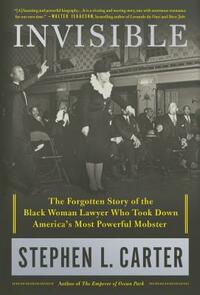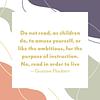Take a photo of a barcode or cover
92 reviews for:
Invisible: The Forgotten Story of the Black Woman Lawyer Who Took Down America's Most Powerful Mobster
Stephen L. Carter
92 reviews for:
Invisible: The Forgotten Story of the Black Woman Lawyer Who Took Down America's Most Powerful Mobster
Stephen L. Carter
This was a fine read but I wish it would have focused more on the actual trial of Luciano. All the contextual information about the family was helpful, but the actual trial portion is quite small in this book.
This story/topic was interesting, but the execution was pretty convoluted. I enjoyed learning about Carter's grandmother. I think he attempts to do her story justice, particularly as she has been forgotten and ignored by history. However, the book contains so many sidenotes, digressions, and random anecdotes about these people that it is hard to keep track of the central narrative. Overall, I think the book could have been shorter and better organized (or perhaps re-titled to better represent the fact that it has little to do with the mobster story).
challenging
informative
slow-paced
This is an interesting book about a fascinating and complicated woman who defied the odds to reach great heights as a lawyer and activist in 1930s-50s New York. The book is written in a more simple "pop" style, in a way that kind of reminds me of "The Five". There is a lot of information here about the lives of the upper crust of the Harlem Renaissance, as well as insight into how legal cases are built and American electoral politics in general. I liked the way family stories were woven in even if the record proved them inaccurate in one way or another because it gives an insight into how she was viewed by her contemporaries that might not be visible in just the archival material.
I do think the Lucky Luciano aspect is oversold on the blurb (it does pop back up now and then but the majority of the information about the case is covered in maybe 50 pages) and the way her brother's communist activities are written about is in this hand-wringing tone that borders on parody at times.
I do think the Lucky Luciano aspect is oversold on the blurb (it does pop back up now and then but the majority of the information about the case is covered in maybe 50 pages) and the way her brother's communist activities are written about is in this hand-wringing tone that borders on parody at times.
Moderate: Misogyny, Racism, Trafficking
Minor: Addiction, Cancer, Child death, Death, Infidelity, Racial slurs, Slavery, Toxic relationship, Police brutality, Kidnapping
I picked this up because I was interested in an African American woman having brought down Lucky Luciano. I enjoyed that part of the story. I don't particularly care for politics in anyway so the rest the book was quite dull for me.
As a lawyer so I was pretty excited for this book and for the story. Unfortunately, it just didn't captivate me. It read like a textbook and the story was all over the place. I also was hoping for more into the actual trial and how she brought the mobster down, but that was a pretty short part of the book.
The story within Invisible is an important one, but unfortunately it reads too much like a textbook. As author, Stephen L. Carter, weaves the tale of Eunice's childhood, contributions, scholarly pursuits and beyond, the reader becomes so lost in the details that the important contributions of Eunice Hunton Carter are buried. It was more than evident the author’s motivations for writing this book, as his grandmother it was crucial for him to put her story on paper. However, from a broader stroke this story is critical for the wider population.
Eunice was a female, African American lawyer in a time when there were few. She played a key role in taking down one of the most powerful mafia bosses of her time and, like the ladies of “Hidden Figures,” Hunton Carter should be a household name, but isn’t. Unfortunately, the textbook-esque, dullness of this read does her story no favors.
As a reader, I would have liked to see more if Lucky Luciano’s storyline throughout, given his take down was the highlight of Hunton Carter’s career. Additionally, her contributions to the NAACP and importance of her “volunteer” work are downplayed or otherwise lost to the MANY mundane facts, details and names mentioned within.
*Disclaimer: A review copy of this book was provided by LibraryThing in exchange for an honest review.
Eunice was a female, African American lawyer in a time when there were few. She played a key role in taking down one of the most powerful mafia bosses of her time and, like the ladies of “Hidden Figures,” Hunton Carter should be a household name, but isn’t. Unfortunately, the textbook-esque, dullness of this read does her story no favors.
As a reader, I would have liked to see more if Lucky Luciano’s storyline throughout, given his take down was the highlight of Hunton Carter’s career. Additionally, her contributions to the NAACP and importance of her “volunteer” work are downplayed or otherwise lost to the MANY mundane facts, details and names mentioned within.
*Disclaimer: A review copy of this book was provided by LibraryThing in exchange for an honest review.
informative
reflective
medium-paced
Solid 3.5. An interesting look into the life of an often overlooked and ignored historical figure.
Subtitled "The forgotten story of the black woman lawyer who took down America's most powerful mobster". It turned out that that part was just a small portion of the book. The book was written by the grandson of Eunice Carter, himself an acclaimed author. Unfortunately, this book reads more like a textbook. It seems to be meticulously researched; however, has no attributes by Eunice. So he adds a lot of supposition to how she might have felt or reacted when he really has no firsthand knowledge as Eunice did not leave any memoirs behind and she died when he was young. I was intrigued by the story and amazed at the professional level she attained as a black woman (the author refers to blacks as a Darker Nation) in the 40's and 50's. It was very interesting to read about the society (sassiety) of upper class blacks at the time but I think Mr. Carter dwells too much on that aspect of life which, for me, decreased my appeal to Eunice. And although I admire her, the fact that she had her son live with relatives or in boarding school for most of his years so she could make a name for herself, detracts from her image.
I, for one, did not know that Lucky Luciano was taken down by an African American woman prosecutor in the 30s. Amazingly enough, this is only a tiny part of the story of Eunice Hunton Carter (the grandmother of the author), a remarkable woman, who should have had a more brilliant career than she did, being constantly passed over for higher positions because of her sex and race. The life of EHC is fully embedded in the activism of her parents (her mother toured the segregated and lynching South, on her own, to organize African Americans, her father was an officer in the WMCA), the Harlem Renaissance, luminaries such as W.E.B. Dubois, Thurgood Marshall, and the rest of the African American cultural elite. EHC both resented and had to submit to the demands of institutional racism and sexism, but also the demands the Harlem's Great Social Pyramid ruled by the Czarinas.
The book starts with the Atlanta riots of 1906 (her family lived there at the time) all the way to the McCarthy era (her brother was a communist who ended up leaving the US and joining Dubois in Ghana, and then settling in Zambia). EHC had judicial and political ambitions tied to Thomas Dewey and the GOP, squashed on both counts (and also because the FBI, under Hoover, had listed her brother as one to arrest in case of national emergency and had a 700-page file on), later reinventing herself as an internationalist after the creation of the UN (she did not like FDR but stroke a friendship with Eleanor Roosevelt). As successful as she was, there is no question that systemic and personal elements outside of her control (racism, sexism, red scare) thwarted what should have been an even more major career than she had.
The book starts with the Atlanta riots of 1906 (her family lived there at the time) all the way to the McCarthy era (her brother was a communist who ended up leaving the US and joining Dubois in Ghana, and then settling in Zambia). EHC had judicial and political ambitions tied to Thomas Dewey and the GOP, squashed on both counts (and also because the FBI, under Hoover, had listed her brother as one to arrest in case of national emergency and had a 700-page file on), later reinventing herself as an internationalist after the creation of the UN (she did not like FDR but stroke a friendship with Eleanor Roosevelt). As successful as she was, there is no question that systemic and personal elements outside of her control (racism, sexism, red scare) thwarted what should have been an even more major career than she had.





